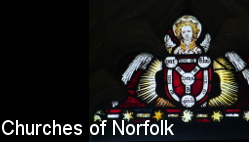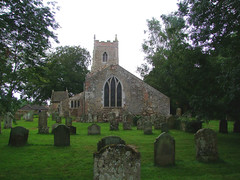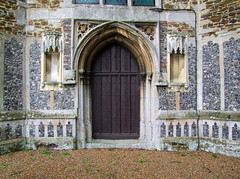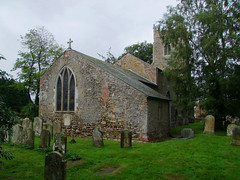| |
|
St Mary,
West Winch
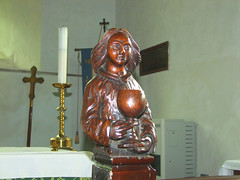 |
|
I'd
been wanting to see inside West Winch church for
years, and it hadn't been for want of trying. The
church sits, a little sulkily perhaps, just back
from the A10 which hurtles traffic through on
what is the main village street at this point.
There's a shop across the road, houses all
around, and so there is no reason whatsoever why
the church can't be open during the day. But it
never was - or, at least, I had never found it
so, and nor had anyone else I asked. There wasn't
a keyholder notice either, and so although I cast
occasional glances at it on the map, I managed to
resist the temptation of making the 150-mile
round trip on the off-chance. I was
passing this way in the summer of 2016 with my
friend John, who visited all the churches of
Norfolk in the 1980s and is keen to repeat the
feat. Incidentally, he tells me that many more of
them are open now than were thirty years ago. We
were just passing through West Winch, and thought
we'd give the church a try, and of course it was
still locked. But John had noticed that a new
church warden was listed on the Diocesan website,
so we rang her up, just in case she'd be prepared
to come and open up.
|
Well, she
couldn't have been more helpful. She was actually about
to leave for the Sandringham flower show, but she put off
her departure to come and let us in. She was very jolly
and welcoming, and West Winch should be proud of her. She
did mention that she'd been getting rather a lot of calls
just recently to come and let people into the church, but
I expect she's probably far too nice to suggest to the
PCC that, to stem this tide of interruptions, they should
open the church during the day, which of course they
should.
St Mary is
an imposing church of carstone and ashlar. Its west front
faces the street, and a rather grand porch hides a
sprawling south aisle. The porch is a curiosity, because
it is 14th Century and it is hard to see how the aisle
can predate it, but it rises above the roofline of the
aisle as if a rebuilding of the aisle was an inevitable
consequence of the porch being erected. But it never
happened. Probably, the aisle is contemporary with the
chancel, there were big plans which began with the porch,
and then a hundred years or so passed before the tower
went up and the nave was rebuilt. The sundial on the
porch is dated 1706, with the initials TB and RC. Above
it reads Hora Moner, presumably a misinscription
for Hora Moneo, 'I advise the hour'.
The porch
has another curiosity in store, because the side windows
are filled with extraordinary windows of layered glass,
one depicting verses from the Book of Proverbs, the other
from St Paul's Letter to the Corinthians. They are the
work of the Kings Lynn Glass Workshop. I've never seen
anything quite like them before.
| St
Mary is a big church, but the interior is
intimate, a fitting space for rural Anglican
worship. The nave is warm and seemly, the chancel
rather more exciting, drawing the eye to the
east, which is as it should be of course. The
east window, depicting the Day of Pentecost, is
remarkably good 1880s work by Clayton & Bell,
the workshop at its best. There are
more curiosities to come in the chancel. Built
into the altar rails are four demi-figures. A
bearded man holds a bag of money, a long-haired
woman holds a bowl, a long-haired beardless man
holds a chalice, and a bearded man holds an
elaborate cross. They are probably intended to
represent St Matthew, St Mary Magdalene, St John
and St Philip. They look as if they were probably
part of a larger set. I wonder where they came
from, and what they were?
Some
more woodwork to intrigue is at the west end of
the nave. It is a bench end carved with a relief
of St Paul. It is so much like the figures on the
bench ends across the river at Wiggenhall St
Mary, that it is hard not to think it may have
come from the same workshop - or even, perhaps,
the same church.
|
|
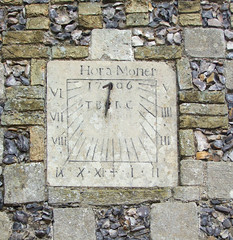 |
|
|
|
